- Home
- Mack Reynolds
The Best Ye Breed na-3 Page 3
The Best Ye Breed na-3 Read online
Page 3
Ryan finished his third double and thought about it for long moments.
Finally, he said, “What if something happens to you before you can make this signature in Hong Kong?”
The Lebanese said smoothly, “Then that would be unfortunate, would it not, Major Ryan?”
Sean Ryan looked at him coldly and said, “Man dear, I suggest you begin thinking of an alternative to that situation.”
III
TOKUGAWA HIDETADA
Colonel Tokugawa Hidetada’s train, that running between Canton and Kowloon, stopped at the border town of Lo Wu. His things went through a minimum of inspection, and, followed by two coolies carrying his luggage, he crossed the bridge and entered a compartment of the train which would take him to Hong Kong proper. This area was the so-called New Territories, on lease to the British colony supposedly until 1997, from the People’s Republic of China. Actually, nobody seemed to know how matters stood. If Hong Kong gave up the New Territories, she could not possibly survive, certainly not with her full population of over three million. The colony including the New Territories measured only 381 square miles in area, but the island of Hong Kong alone was but 32 square miles in area. One does not crowd three million people into such limited quarters.
However, the People’s Republic was making no noises, up to this point, on terminating the lease.
And Tokugawa Hidetada thought he knew why. It was more profitable for the communists to have Hong Kong remain an appendage of the West. Hundreds of millions of dollars worth of trade annually flooded through the free port. Hong Kong was the People’s Republic’s window to the West. In her own right, she was a most profitable source of hard money from abroad, since the colony was far from self supporting in food and in the raw materials she utilized in her highly modernized industry. These she must needs buy from the mainland. No, it would not be profitable for the People’s Republic to close down the British colony of Hong Kong. Had she wanted to, she could have accomplished it easily enough long decades before. Hong Kong itself had no source of water, save rain. Water had to be piped in from the mainland. Cut off from that water supply, and the People’s Republic had every right to cut it, had she wished, Hong Kong could not have lasted a week.
Colonel Tokugawa Hidetada was a small man, in the Japanese tradition. Had he been walking along the street in the Ginza of Tokyo he might well have been thought of as the most average man in sight. He even wore very thick lensed glasses, and had the slightly bucked teeth beloved of American cartoonists depicting a son of Nippon. He did not look like a colonel. Most certainly, he didn’t look like the ace Japanese espionage-counter-espionage operative, working out of the Japanese department which was the equivalent of the American CIA, the Soviet KGB.
He took the train to the Kowloon station next to the Star Ferry terminus and then, carrying his own bags now, the ferry to Victoria, the city of Hong Kong island. The crossing took five minutes and since he had made the trip more times than he could possibly remember, he ignored the exotic sights and sounds of the teeming harbor, the large number of foreign ships, the wallah-wallah launches, the junks and sampans.
On the Victoria side, he took a hovercar to the Japanese consulate.
One of the two plainclothesmen there politely murmured greetings to him and took his bags from the cab and led the way into the interior.
The pretty Japanese girl at the reception desk was attired in a shibui kimona. At the colonel’s approach she came to her feet and bowed thrice deeply, before resuming her seat.
He told her that he had an appointment with Prince Genji Shikibu.
Her desk equipment was all but identical to any that might have been found in Common Europe or the United States of the Americas. She utilized it.
Within moments, a European clad consular aide appeared from a rear door and exchanged polite bows with the colonel and led the way for him, although Tokugawa Hidetada had been over the route a few score times.
The aide knocked discreetly at a beautifully engraved door of black wood and opened it. The colonel entered.
The room beyond was a combination of half Japanese, half western. Aside from the inevitable portrait of the Mikado, the room’s sole decoration was a statuette carved of white and green jade, set into an alcove. It was exquisite. The last time the colonel had been here, the alcove contained an antique ivory piece. The prince periodically changed his displayed art objects, but there was never more than one in any room of his quarters. The Japanese do not believe in art in quantity, preferring to be subjected to but one piece at a time. There is no such thing as an art museum in the land of the rising sun. The art conscious people do not wish to be beaten over the head with a surfeit of beauty.
The furniture of the room, including desk, a center table and the chairs, were of the West.
The prince arose at the colonel’s entry. He was a man in his early sixties and wore a black silk formal man’s kimona and a happi, hip length loose jacket of heavy dark blue cotton. On the kimona were discreet mon, family crests of the prince which added to its elegance.
The colonel, hands stiff at his sides, bowed deeply several times and the prince nodded and gestured to the table. They sat and almost immediately a girl entered. She wore a heavily embroidered, brilliantly dyed kimona and was heavily made up and coiffed almost in the style of a geisha. She bore a tea tray and bobbed her bows half a dozen times before serving the men, who paid her no attention. She was, undoubtedly, the colonel thought, one of the prince’s concubines.
When she had gone, they sipped their tea and the colonel commented upon its excellence.
The prince finally stroked his wisp of white beard and said, “And your mission in Canton, Colonel?”
“I am embarassed to reveal that I have had insufficient time to bring it to a successful conclusion. Although I speak the Cantonese dialect and hence am able to merge quite easily into the streets, the authorities are quite efficient in their security measures and one must proceed with great care.”
The prince nodded understanding and said, “It is of no matter. We are withdrawing you from the assignment, for one of more importance.”
Tokugawa Hidetada bobbed his head in acceptance of that and looked into the other’s face politely, awaiting his new instructions.
“We are aware, Colonel, that your duties kept you in the Near East for nearly five years. How is your Arabic?”
“Not quite perfect, Your Higness, but almost so. I have a slight accent. However, that is not the handicap in Moslem nations that it might be elsewhere. The Arabic of Saudi Arabia differs somewhat from that of even nearby Egypt and that of Egypt from, say, Algeria. Thus a Moroccan, speaking with me, might well think I was from Jordan or Syria, and a Syrian might come to the conclusion that I was from Algeria.”
“Very well. That is not of major importance. Yur dossier tells me that you are also conversant with Esperanto.”
The colonel bobbed his head in admission. “It has been a hobby since my youth.”
“Excellent. It is one of the reasons that you have been chosen for this assignment.”
The colonel held his peace politely.
Prince Genji Shikibu said, “I doubt that you have heard of El Hassan.”
“No, Your Highness. Your servant is shamefully ignorant.”
“It would be unlikely that news of his astounding appearance onto the world scene would be released by the Cantonese press. It will probably be some time before the Chairman and the Central Committee of the Chinese Communist Party have decided upon a stand to take on El Hassan.”
He poured more of the green tea, before going on.
He said, “Northern Africa, Colonel, has erupted. News filtering out is fragmentary. However, this much we know. Within months, actually not much more than weeks, a new figure has manifested itself in the Sahara and, indeed, throughout the area north of the Congo. His movements are sweeping through the desert and its borders like wildfires. Areas far and beyond the size of all Japan have been taken ove
r by his followers.”
The colonel indicated his surprise by sucking in air, politely.
The prince took a new tack. “As you are aware, Colonel, Japan is for all practical purposes without natural resources. We must import practically all, for our industries. For instance, we are the third greatest producer of finished steel in the world, but both our iron ore and coal must come from abroad. It becomes an increasing problem. Indeed, our economy is confronted with disaster. The first blow came with the Arab oil cartel and we were hard put to avoid complete collapse.”
The colonel nodded politely to accept the truth of that. All Japan was acquainted with the fact.
The prince went on. “Africa, and particularly North Africa, is one of the few remaining all but completely undeveloped areas of the world. If El Hassan is successful in realizing his ambitions he will be in control of a wealth of raw materials in one nation unrivaled, save possibly, only possibly, in the Soviet Complex. There are few raw materials necessary to modern industry that are not to be found in profusion in Northern Africa. Colonel, I must be blunt. We must gain access to these raw materials, or Japan dies.”
The colonel’s face went blank.
The prince took a deep breath and then continued. “In Mauretania alone—and El Hassan’s followers are already said to be in control there—are deposits of copper far greater than those of Chili or Katanga, iron deposits richer than those of Labrador or Venezuela. In Algeria and Libya oil gushes from the sands, far beyond the needs of our country.”
The colonel bobbed his head in acceptance. “And my assignment, Your Highness?”
The other hesitated. “We actually do not know. El Hassan is a mystery. Is he a religious fanatic, a new Mohammed come out of the desert? Is he a communist, strongly opposed to us capitalist nations? Is he a racist, strongly against all but blacks? Is he an anarchist, decrying modern industry, modern socioeconomic systems? This we must know. We must know whether our path leads to supporting this mysterious El Hassan and coming to agreements with him to secure his raw materials in return for our manufactured products, or if we must vigorously combat him and continue to deal with the present governments of the states he is attempting to overwhelm.”
The colonel nodded.
The prince hesitated before adding, “The rumors about El Hassan are endless. Some indicate that he has reservations about trading North Africa’s raw materials to the developed countries, except at exorbitant prices. However, other rumors indicate that some of his closest colleagues are less extreme and desire the aid of such countries as Japan to speed the modernization of Africa. One in particular, Field Marshal Bey-ag-Akhamouk, seems particularly to have strong opinions of his own. Perhaps you will find it suitable for us to back him, if he is at odds with this El Hassan.”
The prince came to his feet.
He said, “You will leave immediately for North Africa and find the answers to the questions we ask about El Hassan and his follower Bey-ag-Akhamouk and their effect upon our future. You will report directly to me and take no overt action, no matter what the provocation, until we have passed upon it.”
The colonel also stood and bowed his acceptance. “Your Highness,” he said.
IV
SERGE SVERDLOV
Colonel Serge Sverdlov was retracing a route he had covered so often that he didn’t bother to watch the passing scene as his automated hover limousine took him past St. Basil’s Cathedral, on one side of Red Square, to cross the Moscow River by the Moskvoretski Bridge and into the traffic of Pyatnikskaya. The car turned west at Dobryninskaya Square to Gorgi Park. It ran along that on Kaluga until it pulled up before the aged Czarist baroque palace, once belonging to the Yusopov family, the scion of which had assassinated the mad monk Rasputin, but which now housed Sverdlov’s branch of the ministry.
He had sometimes wondered why the organization of which he was a part had never moved to more spacious and certainly more modern quarters. It was, from his viewpoint, by far the most important, most powerful, and most feared ministry of the Soviet Complex.
It had a lengthy history. In its beginnings under Lenin, it had been known as the Cheka, which took its name from Chrezvychainaya Kossmissiya; its full title being Extraordinary Commission for Combating Counter-Revolution, Sabotage and Speculation. It had been abolished in 1922 to make way for an organization still more famous, the GPU, standing for Gosudarstvennoye Politicheskoye Upravleniye, or State Political Administration. Stalin decided ten years later in 1934 to do away with the OGPU and reorganized it under the name of NKVD or People’s Commissariat of Internal Affairs. Twelve years later, it was replaced by the MVD, the Ministry of Internal Affairs. Still later, the organization split into internal and foreign branches and the KGB, Sverdlov’s organization, the Committee of State Security, became the secret police, particularly involved in counter-espionage, espionage and security. It fulfilled much the same functions as the Central Intelligence Agency of the United States in gathering and evaluating information but also had police powers similar to those of the FBI.
Yes, it was to this branch of the Soviet Complex’s government that Serge Sverdlov devoted his services. He was a mediumly built man but more than ordinarily lithe; the slight slant of eyes, the darkness of complexion, give suspicion of his Cossack heritage. His teeth were white, perfectly so, and his smile good—when he smiled. But there was something about his eyes. The story was in international espionage circles that he had killed more men than cholera. He had worked abroad on enough assignments that he had picked up taste in clothing and was attired more nearly as a London clubman than a Moscow gumshoe.
He left the hover limousine and strode toward the elaborate entrada of the Yusopov palace. There were no flags above it, no signs nor anything else to indicate that the present nature of the pre-revolutionary building was what it was, save the two uniformed guards in front. They snapped to the salute upon his approach but since he was in mufti he ignored them and passed on into the building.
There were two more guards there, but Colonel Sverdlov was well known and he ignored them and went on.
He was thoroughly familiar with the building and, as he had often before, wondered that anyone, even a Czarist prince, would choose to live in such sterile surroundings. He strode along marble halls. All about were a profusion of alleged art objects which went back to the old days, paintings, statuary, furniture. No one, down through the decades since the revolution, had ever bothered to move them. The tastes of the Czarist aristocracy had been abominable.
The colonel reached the heavy doors of the office to which he was bound and the lieutenant at the desk there looked up, at first impatiently, but that expression was immediately wiped from his face.
“Yes, Comrade Colonel,” he said snappily.
Sverdlov said, “I believe that the Minister is expecting me.”
“Yes, Comrade Colonel. His orders are that you be admitted immediately.”
The colonel opened the door and passed through.
The office beyond was large but not ostentatious. The Minister was of the old school and had actually first joined the organization as a youth when Beria was still in his final days and Stalin in full power. He affected simplicity, despite his rank. The fact that he still held his position was testimony to his ability to roll with the blows.
Minister Kliment Blagonravov was already looking at the door at Colonel Sverdlov’s entry. He was a heavy man, heavy of face and heavy-set. His head was shaven, though that old style of the Party’s military men and upper-echelons of police officials had all but disappeared. His simple jacket of the type once de rigueur in the times of Lenin and the Old Bolsheviks, now an affectation, was hung over the back of a chair and his collar had been unbuttoned, but he was still sweating. Not for Kliment Blagonravov the effeminacy of air-conditioning.
He projected a camaraderie with his more trusted agents, and said now, in supposed heartiness, “Serge! We see too little of you these days!”
The KGB agent was fully
aware of the iron beneath the lard of his ultimate superior. He said ruefully, “I see too little of Moscow, Comrade Blagonravov. No matter how dedicated, one misses home.”
“Yes, yes, of course. It is a shame that Party duties keep you abroad so much, Serge. You are too confounded efficient. Sit down, sit down.” The bureaucrat swung in his chair so that he could reach the bar set into the wall behind him. As the colonel found a chair, he opened the door of the refrigerator compartment and came forth with a bottle, slightly yellowish in color of contents. He plucked two three-ounce glasses from the bar’s top and swiveled back to his desk.
“As I recall, Serge, your favorite is Zubrovka vodka. A sprig of that particular Polish grass to flavor it. Personally, I prefer Stolitschnaja but I shall join you.” He poured the glasses full and pushed one of them over to his subordinate.
Sverdlov nodded his thanks, even as he took up the glass. It was proverbial that no matter what the hour, one did not get through Blagonravov’s office without emerging with at least a slight glow on. Woe betide the teetotaler summoned into the Minister’s presence.
“It’s been a long time,” the colonel said, holding the glass up in toast. “The drink in Indonesia is atrocious, particularly what they are pleased to call vodka. It comes from Japan, so I understand, and is probably made from rice.”
“The world revolution!” the minister said, holding his own chilled spirits up.
“The revolution,” the colonel said, repeating the standard formula.

 Happy Ending
Happy Ending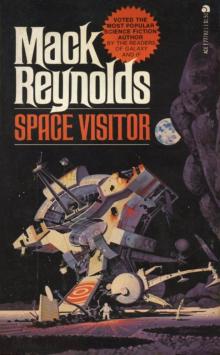 Space Visitor
Space Visitor A Kiss Before Loving
A Kiss Before Loving Episode on the Riviera
Episode on the Riviera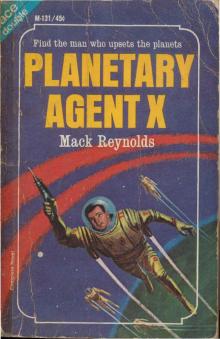 Planetary Agent X
Planetary Agent X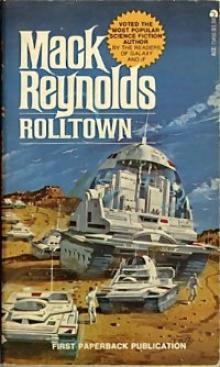 Rolltown bh-3
Rolltown bh-3 The Second Mack Reynolds Megapack
The Second Mack Reynolds Megapack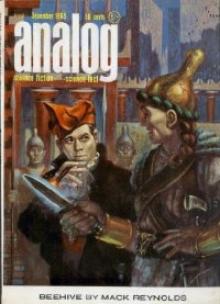 Dawnman Planet up-2
Dawnman Planet up-2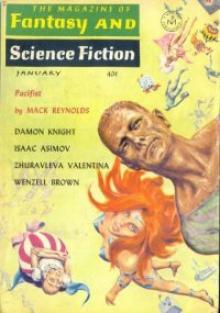 Pacifist
Pacifist The Other Time
The Other Time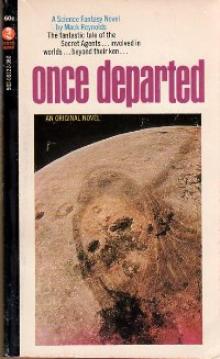 Once Departed
Once Departed IQ
IQ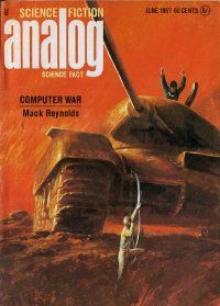 Computer War
Computer War Earth Unaware
Earth Unaware The Rival Rigelians up-3
The Rival Rigelians up-3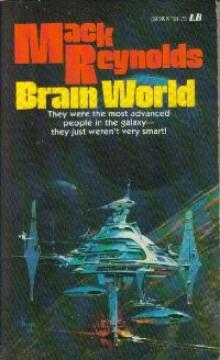 Brain World up-7
Brain World up-7 Star Trek - TOS - Mission to Horatius
Star Trek - TOS - Mission to Horatius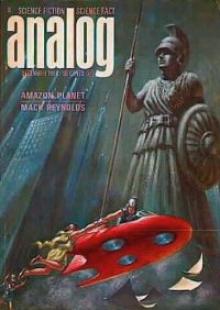 Amazon Planet up-5
Amazon Planet up-5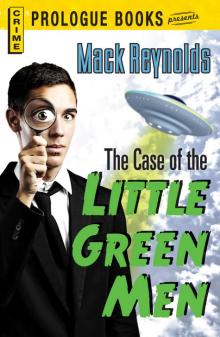 The Case of the Little Green Men
The Case of the Little Green Men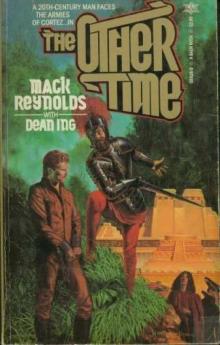 Other Time
Other Time The Mack Reynolds Megapack
The Mack Reynolds Megapack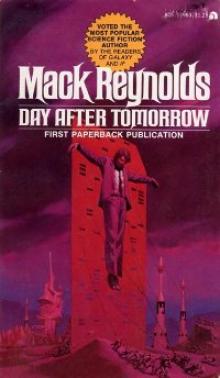 Day After Tomorrow
Day After Tomorrow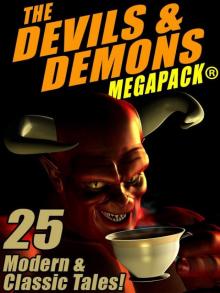 The Devils & Demons MEGAPACK ®: 25 Modern and Classic Tales
The Devils & Demons MEGAPACK ®: 25 Modern and Classic Tales Mission to Horatius
Mission to Horatius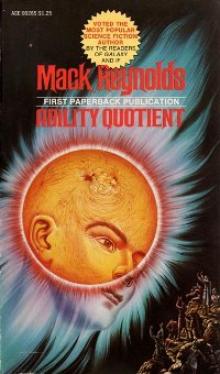 Ability Quotient
Ability Quotient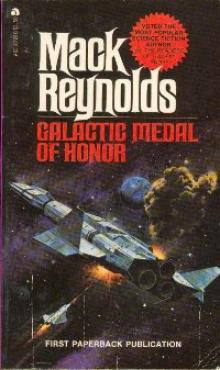 Galactic Medal of Honor
Galactic Medal of Honor Trojan Orbit
Trojan Orbit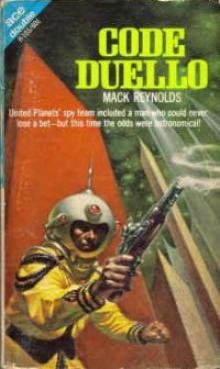 Code Duello up-4
Code Duello up-4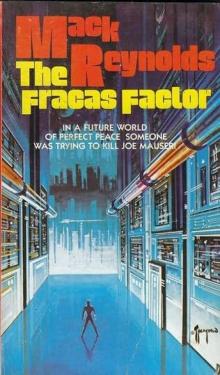 The Fracas Factor
The Fracas Factor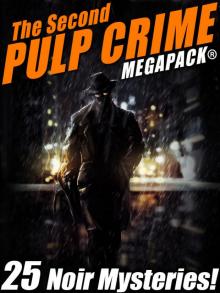 The Second Pulp Crime
The Second Pulp Crime Deathwish World
Deathwish World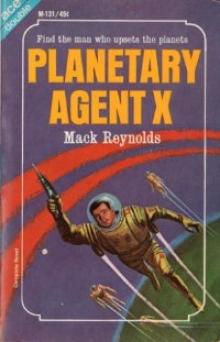 Planetary Agent X up-1
Planetary Agent X up-1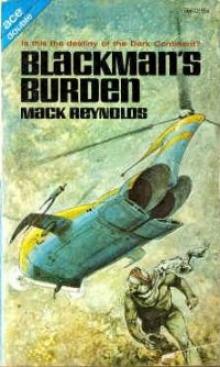 Blackman' Burden na-1
Blackman' Burden na-1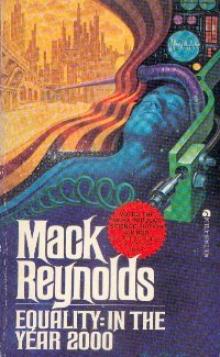 Equality: In the Year 2000 jw-2
Equality: In the Year 2000 jw-2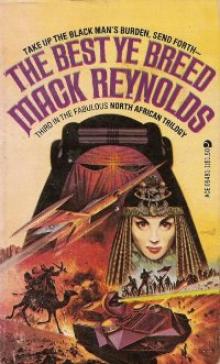 The Best Ye Breed na-3
The Best Ye Breed na-3 The Jet Set
The Jet Set The Rival Rigelians
The Rival Rigelians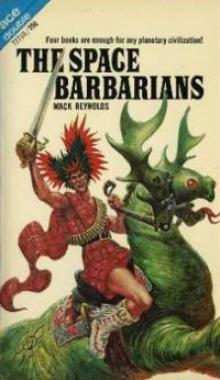 The Space Barbarians
The Space Barbarians